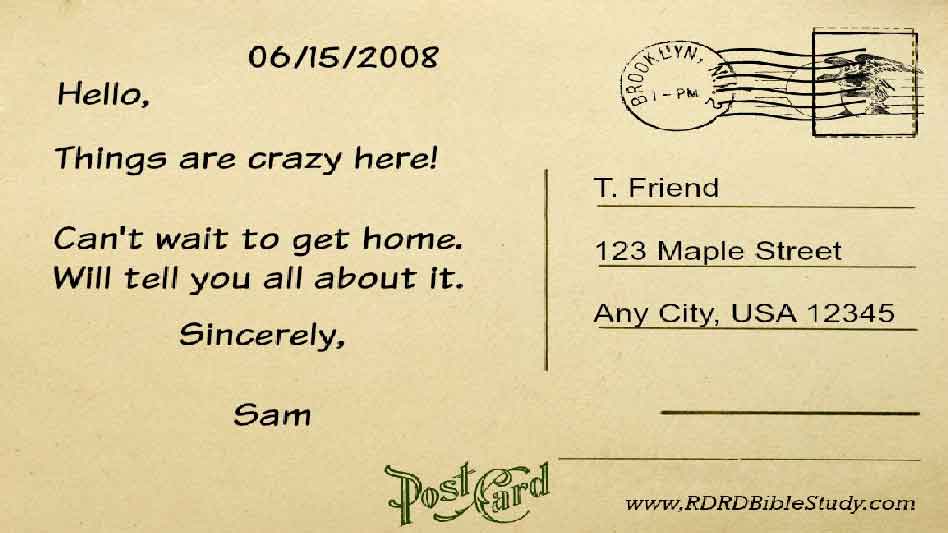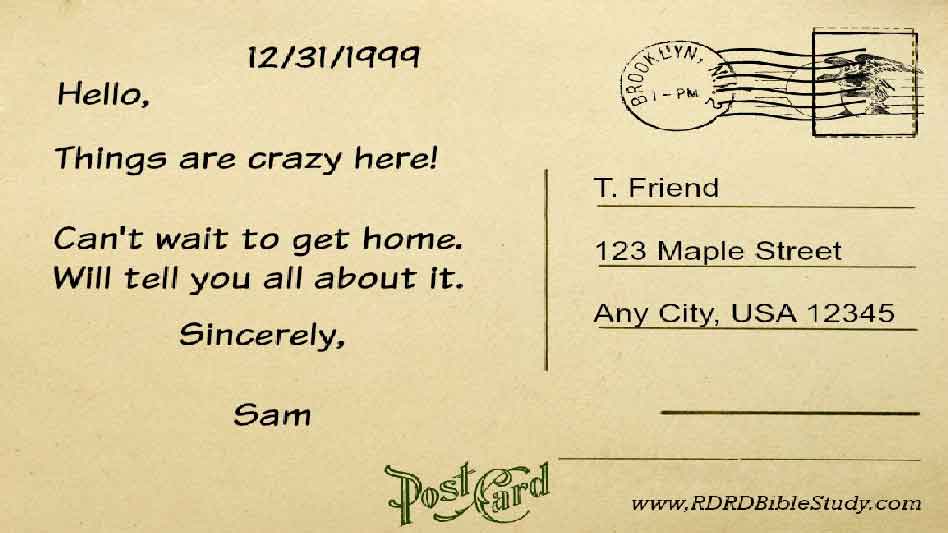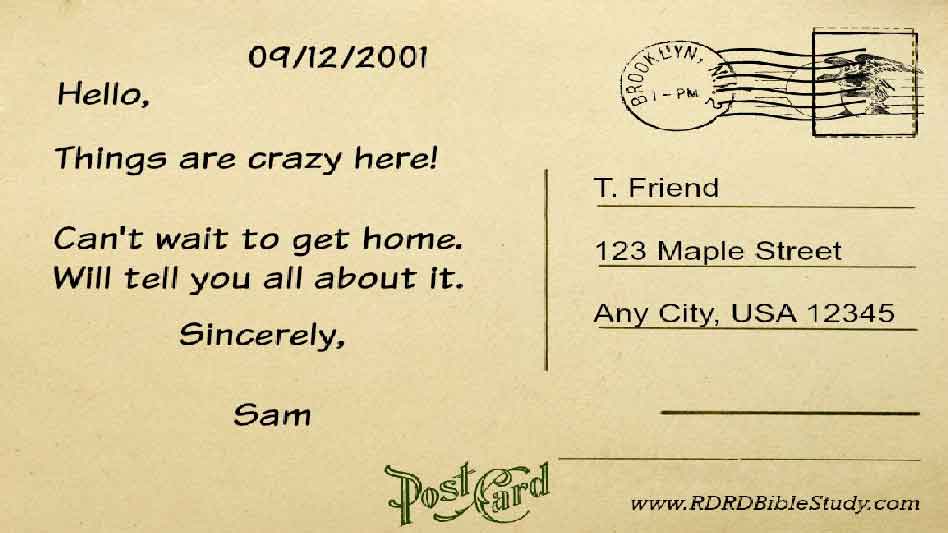Do you know the #1 way to put a Bible class to sleep?
I’m not talking about nodding heads, blurred eyes, or huge coffee-breath yawns. Those qualify as signs of life in most churches today. I’m talking about out-like-a-light, sawing logs, coma induced, stage 3, dead to the world sleep.
What Bores Me To Death?
In the quest to find the cause of sleepy Bible classes, I did some soul-searching. What bores me to death? What induces out-like-a-light, sawing logs, coma induced, stage 3, dead to the world boredom? I came up with this list:
- Reading a book about how to organize your home <yawn>
- Listening to someone brag about their children non-stop <yawn, shoot me dead>
- Listening to someone talk about their health issues non-stop <yawn, TMI>
- An instructor talking about anything but the subject <yawn, who hired you?>
- A speaker who reads PowerPoint slides <yawn, I could have stayed in bed>
What do these have in common, besides the yawns? All are a complete waste of time (IMO).
Organizing drawers and color coding drive me crazzzzZzzzzzzz Zzzzzzz…. Uh, sorry. Listening to stories about children or health issues is fine, but I don’t think your kid is better than everybody else’s and I don’t want my imagination filled with gross surgical procedures. And why would anyone need an instructor except to learn about the subject? And if you are going to read PowerPoint slides, save everyone some time and e-mail them, okay?
After evaluating this list of personal sleep inducers in order to better understand what bores others, here’s my conclusion:
The items above are not relevant to me!
Do Other People Think “The H-bomb is not relevant to me!”?
Maybe dropping an h-bomb in Bible class causes people to think the same thing? Maybe people think “I came here to learn about the Bible!”
- History, i.e. the h-bomb, isn’t relevant to me (whine…).
- Can’t we talk about my amazing kids (whine…)?
- Or why don’t you read us some PowerPoint slides (whine…)?”
H-Bomb = History
So yes, the h-bomb = History. Say “history” once in a Bible class, and the people will zone out quicker than Hillary Clinton being asked about e-mail. So, let’s call it something else for now, okay? Instead of saying the real word for h-bomb, we will call it “yesteryear” because at least “yesteryear” is fun to say.
Maybe “yesteryear” is boring because it brings to mind high school yesteryear teachers and yesteryear classes. Both bore to death. Who of us ever thought for one minute Ponce de Leon, William Penn, or Lyndon Johnson would have any relevance in our lives?
Thinking about high school yesteryear makes people yawn. It’s like Paplov’s dogs. Instead of salivating, we have been conditioned to yawn—at any time, any place.Drop a big, or little, h-bomb in a Bible class, and you can predict the response—automatic yawning. Since the h-bomb induces these obese intakes of oxygen, it makes sense that it is a conditioned response to the automatic thought—
“History is not relevant to me!”
But ‘untruer’ words have never been spoken.
Historical Context Is Crucial For Understanding Scripture
The historical context of a biblical passage makes all the difference in the world in understanding the meaning of a passage—if you would stay awake long enough to listen. And I am going to prove it with the three postcards below.
Pretend your best friend Sam takes a trip to New York. And Sam sends you a postcard. (he forgot his cell charger, ok? Humor me.) Read each postcard starting with the date. Read the first postcard, and before looking at the next, make a quick note about what you think Sam means. Then the second and then the third.
Postcard 1
Postcard 2
Postcard 3
Well, what did you write down about each postcard? Did the date make a difference?
What Does “Things Are Crazy Here” Mean?
“Things are crazy here” in and of itself is no big deal. But on a postcard from New York…
- 06/15/2008 – your friend is in a huge city, lots of people, taxis, places to see, etc.
- 12/31/1999 – your friend is in NY at the biggest New Year’s Eve party ever! Times Square is full of people, fireworks, confetti, the ball dropping, etc.
- 09/12/2001 – no excitement of a big city on this day, no celebration, but a somber mood as hundreds lose their lives and an entire nation comes to a standstill, on the day after the greatest terrorist act on U.S. soil
Can I ask again—Did the date make a difference? Did the historical circumstances make a difference in how Sam’s postcard was understood by you, the reader? And the answer is…
Yes! It Did! It Made a Huge Difference. Maybe, just maybe…
The H-bomb Is Relevant To Me!
At this point, I hope to have convinced you of the importance and necessity of dropping an h-bomb in bible class, if you weren’t previously convinced.
The main point here is regardless of any outcomes, i.e. snoring, yawning, comas, life support equipment, etc., history must be taken into consideration when studying the Bible.
And you must convince the people in your class, and yourself, that it is a good thing and an important thing. Use the postcards above to convince them of the importance of the h-bomb for any written document. They’ll thank you later.
The postcard examples cover only 1 day, but think about the significance of the h-bomb for longer periods of time:
- The lifetime of Jesus
- The years of Paul’s missionary journeys
- The week surrounding the Day of Pentecost in Acts
- The 50 Days before the Day of Pentecost in Acts
- The time between 1 Corinthians and 2 Corinthians
- The Israelites in Egypt
- The Davidic Monarchy
- The time of Malachi
Yesteryear—and now since I have fully convinced you that it is NOT boring—the historical circumstances, or context, of a particular writing are huge for understanding what the writer intended to communicate to his audience.
Are You Seriously Wanting to Turn On The History Channel Now?
Are you on the edge of your seat? Do you love history now? Have you already subscribed to the History Channel and History Channel 2? Are you wondering how you can find out more about the historical circumstances of a particular Scripture?
Historical context can be found in most commentaries, but before using commentaries, several other places will provide clues. And believe me, the more you do of this kind of study, the more pre-commentary places you will find that provide information about history, culture, social norms, etc. Here are the most common:
1) Bible dictionaries, OT Introductions, NT introductions – all good sources for historical context information, without getting into comments on the specific verses under study.
2) Books related to the culture of the OT and NT periods, Ancient Near Eastern history, Early Roman Empire, etc.
3) Word studies – dictionaries and lexicons will sometimes discuss the earliest use of a word, or the time of use, or even how its meaning may have changed over time; by and large, historical context info is not found in word studies, but every once in awhile you will run across something.
4) And using your sharpest judgment, bias filters, and prayer for Holy Spirit guidance – the internet.
But Does History REALLY Matter?
After all this, still I sense fear and trepidation. I hear skeptics worldwide asking “Does it really, really matter?” And the answer is “Yes! It really, really does.”
To prove it, here’s a quick case study.
Read the following verses and look for a common thread:
Acts 3:20-24 20 that times of refreshing may come from the presence of the Lord, and that he may send the Christ appointed for you, Jesus, 21 whom heaven must receive until the time for restoring all the things about which God spoke by the mouth of his holy prophets long ago. 22 Moses said, ‘The Lord God will raise up for you a prophet like me from your brothers. You shall listen to him in whatever he tells you. 23 And it shall be that every soul who does not listen to that prophet shall be destroyed from the people.’ 24 And all the prophets who have spoken, from Samuel and those who came after him, also proclaimed these days.
Hebrews 1:1-2 Long ago, at many times and in many ways, God spoke to our fathers by the prophets, 2 but in these last days he has spoken to us by his Son, whom he appointed the heir of all things, through whom also he created the world.
2 Peter 1:21 For no prophecy was ever produced by the will of man, but men spoke from God as they were carried along by the Holy Spirit.
Did you see the common thread?
These verses refer to God speaking through the prophets. And even more so, how the words to the prophets have meaning for everyone who has ever read these words, all the way up to us today in the 21st century.
For instance, look at Acts 3:24 “…from Samuel and those who came after him…”. 1 and 2 Samuel can be read easily enough, but to get to the meaning of the text, and how it applies to us today, we need to know the historical context.
It Makes A Difference…
that the man named Samuel came on the scene when the priesthood of Israel had reached one of its lowest low points. And that the content of Samuel records this low point and the beginning of the monarchy in Israel. It makes a huge difference! And what about –
Jonah –the history of the Northern Kingdom of Israel and its neighbor Assyria turns a book about a ‘big fish” into a book about a big God.
Romans – the Gentile majority at the church in Rome, which was preceded by a Jewish majority, along with the current riff between Jews and Gentiles in Rome, answers a lot of questions about Paul’s repetitive phrase “first for the Jew and then for the Gentile.”
The Bible Is God’s Timeless Word to Humanity
The Bible is not a big “thou shalt not” rule book as some people believe. The Bible is God’s timeless Word to humanity. God gave us writings in multiple forms, written by men inspired by the Holy Spirit. Men who lived in a certain time and place—a historical context.
Knowing the historical context helps answer the questions:
- “What is the author intending to communicate to his audience in this passage?”
- “What is the principle behind this message?”
Contemporary application comes from ‘applying’ the same “principle” to a contemporary person’s time and place.
Scripture can’t mean something that the author did not intend it to mean. It can’t mean something different in 2015, or 700, 1200, or 1900 AD.
Hold Up Your Right Hand
Please, please make me a promise. The next time your pastor, Sunday school teacher, small group leader, conference speaker, or friendly Christian blogger drops the h-bomb, don’t yawn!
- Don’t fall asleep!
- Don’t fall into a hypnotic trance!
- Don’t force yourself into a coma!
Instead
- Sit up straight!
- Eyes open wide!
- Coffee in hand (for the fainthearted)!
And say
“The h-bomb is relevant!”
(hand still up) I will not brag about my kids, discuss my surgeries, or put up with instructors reading Power Point slides to me ever again! I want to know more about this wonderful thing called history!
Take-Aways
- The importance of historical context for bible study can’t be overstated.
- You must be convinced of the importance.
- You must convince your audience of the importance (preferably without a hammer).
**The Second H-Bomb Of Bible Study
Time for Homework (another H-bomb of Bible classes, believe me… though, it doesn’t cause people to sleep, it causes them to run). Using an NT Introduction (some Bibles have these at the beginning of a book):
1- What is the historical context of Jude?
2- What is the message Jude intends to communicate to his audience?
3- What is the main principle behind this message?
4- How does this principle apply to us today in the 21st century?
Put your homework in the comments so we can learn from each other. I promise not to Spam you – that would be so rude. Or you can e-mail the homework through my no-spam-guarantee Contact Page. I will only respond if you ask.
Until next time…
The grace of the Lord Jesus Christ and the love of God and the fellowship of the Holy Spirit be with you all (2 Cor. 13:14).

















